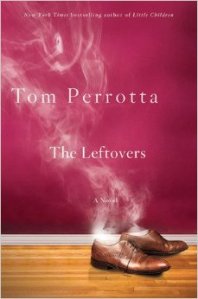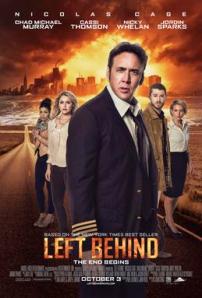The end of the world is a comfort. Things have finally and definitively fallen apart, no more struggle, and, most importantly, all the Big Questions are answered. In literary terms, an apocalypse is a mystery novel. The word means “uncovering” or “unveiling,” the exegesis Sherlock Holmes performs at the close of every story. Religions promise big reveals in the afterlife, delivered on a first come first served basis, but an end-of-the-world apocalypse provides closure to all readers at once.
Sometimes the answers suck. The Walking Dead apocalypse reveals that God is dead, life is brutal, and death a mockery and negation of all human values. But that’s still an Answer. Mystery solved. Horror usually tips the opposite scale: the universe overflows with supernatural import. Sure, most of the supernatural forces want to flay and eat you, but even when they succeed, the stench of blood and brimstone is still comforting. You finally know what’s what—whether Buffy or the Winchester brothers swoop in at the last-minute or not.
But the biggest horror is an apocalypse that doesn’t reveal anything. That anti-Rapture, the ten-episode adaptation of Tom Perrotta’s The Leftovers, has been airing on HBO this summer. Although I’ve met Tom Perrotta (nice guy, drove him back to his hotel after his reading at UVA a few years ago), I have the blissful ignorance of having not read the novel. So I don’t know how season one will end, and based on ratings, season two is anything but a certainty.
That’s appropriate for a show about radical uncertainty. Left Behind, the book series Perrotta is at least partially lampooning, delivers the ur-apocalypse of Revelations, complete with an all-mysteries-solved Antichrist at the center of its plot. The Perrotta Apocalypse is way scarier. When 2% of the planet’s population pop out of existence, the leftover 98% are left without any answers. Dr. Who, in the form of Christopher Eccleston’s American-accented clergyman, says it wasn’t God. A three-year congressional report might as well be blank.
That abyss-deep level of not-knowing is too much for some people. Liv Tyler and Any Brenneman join a nihilistic cult of mute chain smokers hell-bent on proving life is worthless. Their evangelical pamphlets are literally blank. They are the show’s zombie horde: they stare at you blankly from the sidewalk outside your living room windows; they buy your church and paint its windows white; they stage protests at commemorations for your vanished loved ones; they break into your home and steal your family photos from their pictures frames.
At least zombies are accidental. Reanimated flesh-eating corpses are random byproducts of a random universe. Perrotta’s zombies choose meaninglessness, abandoning their families and severing all emotional ties and then terrorizing others into adopting their philosophy—while inwardly struggling to maintain it themselves. People secure in their nihilism wouldn’t bother to terrorize or recruit converts or take vows of silence—behaviors as inherently meaningless as all other behaviors.
But the cult is a fundamentalist church. Most non-apocalyptic atheists don’t congregate in the name of non-God. They have better, more meaningful things to do. But being leftover raises the stakes. When the bank forecloses on Eccleston’s church, he gambles the existence of God at a roulette table. But do three double-or-nothing wins equal divine intervention? Are those pigeons gray-feathered messengers of the Supernatural—or are they just brainless birds? Are the voices in the ex-sheriff’s head evidence of his schizophrenia—or did they send a very corporeal, tobacco-chewing hunter to help his son shoot packs of wild dogs? These and many other burning questions will not be answered next week, or any other week.
Perrotta’s teenagers at least know how to channel their universe’s amoral indifference into an app (in addition to “kiss” and “hug,” a game of spin-the-cellphone includes “punch” and “fuck”). They know the baby Jesus in the town’s Christmas display is just a mass consumer object–yet one so haunted with a residue of meaning that burning it isn’t as easy as stealing it. In this world of heightened uncertainty, even the disappearance of a nametag or a bag of dry cleaning or a bagel is enough to trigger existential crisis.
Although this agnostic apocalypse is Rapture-inspired, it reminds me more of Kurt Vonnegut’s brand of godless humanism. Vonnegut’s end-of-the-world revelations challenge basic assumptions of reality: water only freezes when cold, time moves in one direction, gravity is a constant, humans have free will. After a “timequake” causes years of predetermined repetition, humans find themselves suddenly at the metaphorical wheel again and are so unprepared they literally drive into each other. The Leftovers opens with a similar car wreck, a driverless car careening through a not-just-existential crossroads.
Vonnegut founds his own religions too. The Book of Bokonon announces that its teachings are lies, although useful ones, godly untruths that impose order on an unloving universe. Perrotta’s Guilty Remnant can’t cope with such abandonment and so their lies impose an uglier order. Their leader writes on her tablet: “There is no family.” It’s as true/false as any other religious claim. The “Lonesome No More” government in Vonnegut’s Slapstick randomly assigns the population middle names, providing everyone with an extensive family of siblings and cousins to care for them. It’s nonsense, but it also works. There might not be any Supernatural order to your life, but that doesn’t mean you have to act like a soulless zombie.
If that orderless order sounds too frightening for you, wait till October. The powers-that-be are giving the Left Behind franchise a second chance. Nicholas Cage will be our pilot through the end-of-days reboot.
I’d rather take my uncertain chances with The Leftovers.



A wonderful write-up of a show I’ve been vacillating about–couldn’t tell from TV spots whether or not it would be worth the effort, and now, I’ll certainly take a look.
I’d worried it was a thinly disguised evangelical plea, but it sounds considerably more complex. Thank you!
One caveat, Kate: things didn’t really get rolling for me till episode three, the Eccelston episode.
sad to hear it’s not doing so well. it has been well worth watching, though i’ve been hard-pressed to answer “Why?” – and your piece gives me some ideas, but still no clear answers. which is great – at least HBO usually serves up “interesting.” the white people make me sad and nauseated at times, though your poster of “Left Behind” actually makes me want to weep…
Yes, Nicholas Cage is easily the saddest and most nauseating white person of all.
I’ll give it a go. Maybe I can talk Guthrie into watching.
And maybe there is proof of God after all: HBO renewed The Leftovers for season 2.
Truly, only God could save this series.
Watching this series is psychological torture.
Pingback: The Leftovers | 10,000 días